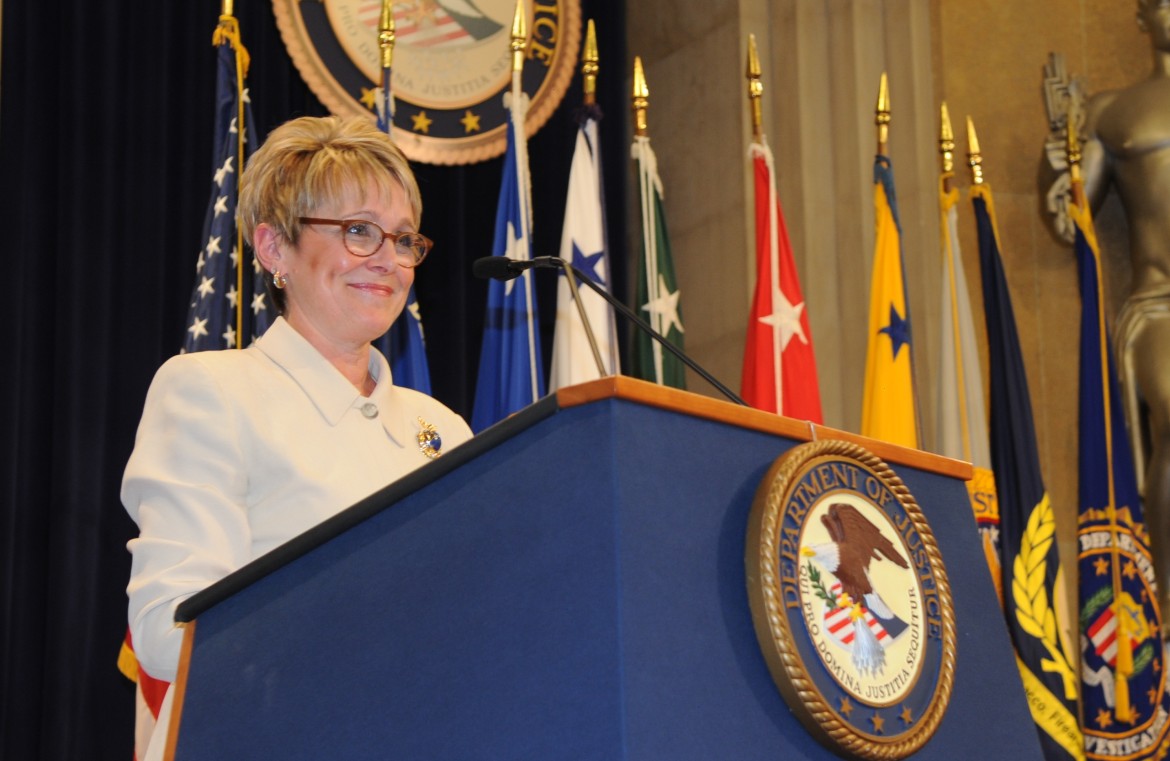
Melodee Hanes, acting OJJDP administrator
WASHINGTON, D.C. – Juvenile justice advocates are dismayed by a new law that they say threatens to accelerate the fading relevance of juvenile justice reform within the federal government.
To the chagrin of many, President Barack Obama has not nominated anyone for the U.S. Senate to confirm as a permanent leader of federal juvenile justice efforts since he took office. For three and a half years, the federal office responsible for setting national policy, sharing research on best practices and funding state initiatives on juvenile justice and delinquency prevention has chugged along on temporary leadership, first under acting Administrator Jeff Slowikowski and since January, under acting Administrator Melodee Hanes.
If the White House does name a person to fill the long-vacant position – something unlikely to happen soon, advocates say, given a looming presidential election -- such a Senate confirmation will never come.
That’s because effective Aug. 10, the process of confirming a person to lead the Office of Juvenile Justice and Delinquency Prevention has fundamentally changed. Under the Presidential Appointment Efficiency and Streamlining Act, passed by Congress and signed by the president earlier this summer, the Senate will no longer have to confirm the nominations of 170 government positions, including that of the administrator of the OJJDP. The president can now simply appoint someone to that office.
“I’m certainly not in favor of it. I think it downgrades the position of the office,” said Gordon Raley, who was staff director of a House subcommittee at the time that the Juvenile Justice and Delinquency Prevention Act of 1974, which created an office focused on juvenile justice and delinquency issues within the U.S. Department of Justice, was being drafted.
“Kids generally don’t have high priority when it comes to the way things are done in Washington,” Raley said. “Kids in trouble even less so. To get someone who will be able to get stature in the position and be able to work across agencies -- that's what the office was supposed to do.”
Ira Schwartz, who was appointed by President Jimmy Carter to lead the federal office, echoed Raley’s characterization of the original intention of the 1974 legislation. It drew tremendous bipartisan support for bringing attention to the “many, many problems” faced by children who came into contact with the juvenile justice system, he said.
“Children were not receiving adequate due process, proper representation in the courts, they were being incarcerated for relatively minor and often times non-criminal offenses,” Schwartz said. “They were also being incarcerated for longer periods of time than their adult counterparts who had committed similar offenses.”
The position of the office administrator came up a lot during the drafting of the 1974 Act, Raley said. “The point we wanted to make at the time was that this was a position that needed a presidential nomination and Senate approval at the same time. It needed this stature.”
JJIE spoke to many other people in the juvenile justice field, including another former administrator of the office, and their views on the change were nearly unanimous: removing the Senate confirmation requirement, even in the name of expediency, will have a negative effect on the ability of the office to advocate for juvenile justice issues at the federal level. Hanes, acting administrator of the OJJDP, did not respond to requests for comment.
“I just don't think you have as much power or as much clout if you don’t have Senate confirmation. They don’t really know you then,” said Marion Mattingly, Washington editor of the Juvenile Justice Update, who has followed the juvenile justice field for decades.
Liz Ryan, president of the nonprofit Campaign for Youth Justice, says removing the requirement for Congressional confirmation opens the doors to more partisan and less-qualified appointees for the office in the future.
“Particularly in a situation where you have an unfriendly administration or an administration that views this as a low priority, we won’t have the ability to stop the appointment or hear their views prior to a vote,” Ryan said.
The director of Georgetown University’s Center for Juvenile Justice Reform, Shay Bilchik, who served as administrator of the OJJDP from 1994 to 2000 under President Bill Clinton, also said he was “disappointed” when he heard the law had been signed.
Sponsored by Sen. Chuck Schumer (D-N.Y.), the Presidential Appointment Efficiency and Streamlining Act is intended to make it easier for the Obama administration to fill 170 vacant federal positions, some with nominees whose confirmations have been blocked or delayed for months by a partisan or distracted Congress. Schumer’s office did not respond to requests for comment for this story.
Some juvenile justice practitioners, however, take a pragmatic approach. Like Irv Katz, president of the National Human Services Assembly, an association of the country’s largest youth and human services organizations, including the Coalition for Juvenile Justice.
“What I would observe is that we have had good and bad people in that position regardless of the congressional approval process,” Katz said. He doesn’t blame the administration for the change.
“The whole appointment and confirmation process is so dysfunctional and fractured, that it leads to nominees who are not confirmed in the appropriate period of time, and nominees that withdraw, and a reluctance on part of the administration to put names forward knowing that it will not move forward,” Katz said. “So it appoints an interim person in the chain of command who they know will do a perfectly fine job.”
Jim Moeser, deputy director of the Wisconsin Council on Children and Families, who serves on the federal advisory council for juvenile justice for OJJDP, also doesn’t see a problem with the change.
“If the confirmation process is so cumbersome and politically problematic that we end up with no one there, then that’s not very useful,” Moeser said.
But, several people have pointed out, there has never been an Obama nominee for the job of OJJDP administrator, even though, as JJIE’s sister publication Youth Today reported at the time, two candidates, Karen Baynes of Georgia, and Vicki Spriggs of Texas, came close in 2009 and 2010 respectively before withdrawing from consideration.
“The fact that this administration wasn’t even able to provide a name, or feel strongly enough that they could find someone, tells me that’s a problem with this administration giving this a priority, than it is with the Senate not pushing it through,” Raley said.
Photo by Justice.gov
